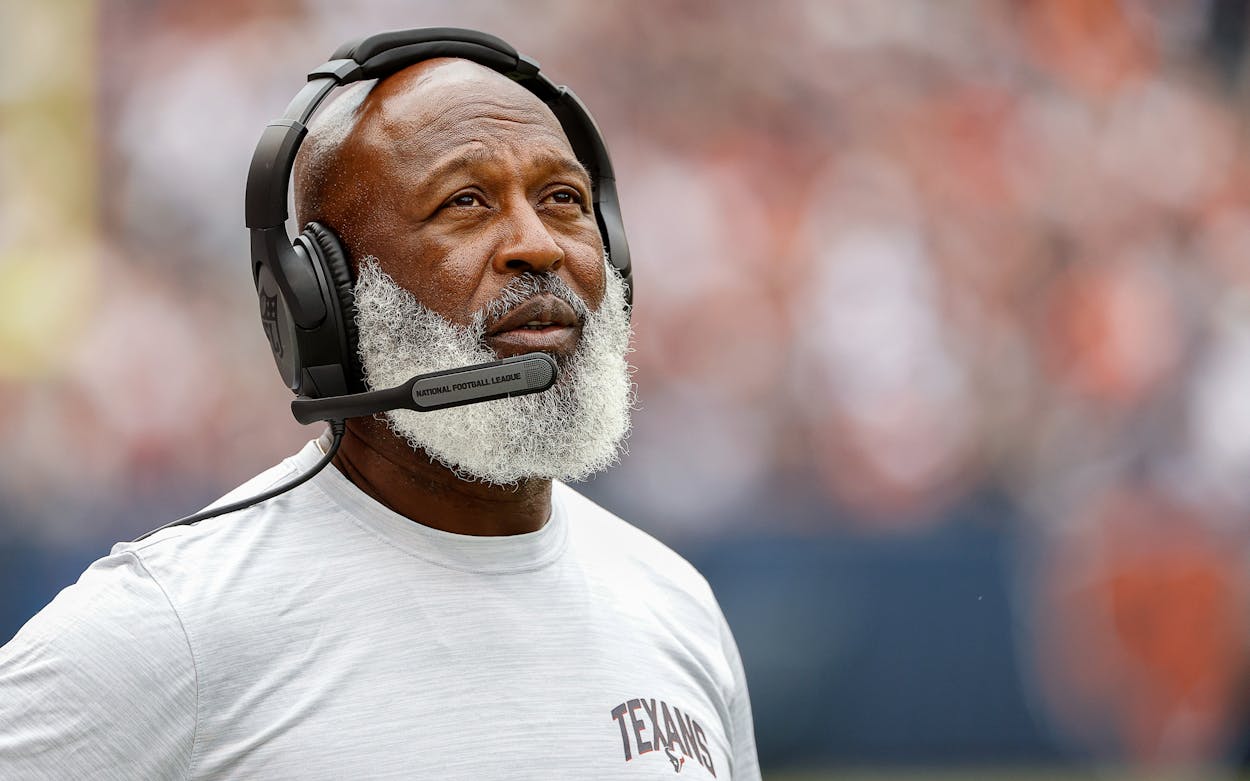On Sunday, the Houston Texans blew it. On fourth and twenty from the Indianapolis Colts’ 28-yard line, down by seven points with less than a minute to play, quarterback Davis Mills dropped back, surveyed the field, and found receiver Jordan Akins in the end zone for a touchdown. Lovie Smith, the team’s first-year head coach, saw an opportunity to seal the season on a high note and blew off overtime—instead, he called a two-point conversion, on which Mills and Akins connected once more to put the Texans ahead. All that was left was to watch former University of Texas signal-caller Sam Ehlinger, now a Colt, fail to get his team within field-goal range, and Houston had won 32–31. The victory means that instead of claiming the first overall pick in the 2023 NFL draft, the Texans will draft second, behind the Chicago Bears. Thanks to Smith’s decision to win a football game, Houston ceded the ability to control which of this year’s top quarterback prospects will be wearing Battle Red next year.
A few hours later, Smith was toast. Texans chairman and CEO Cal McNair released a statement announcing that he and general manager Nick Caserio “spoke with Lovie Smith tonight and informed him that we will be moving in a different direction as an organization.”
It’s not unusual for the head coach of a team that went 3–13–1 to lose his job, but it is unusual to do that to a first-year coach who was hired to replace another first-year coach, who, the previous season, finished 4–13. Before that coach, David Culley, was hired, he replaced Romeo Crennel, the interim head coach who’d replaced Bill O’Brien after the first four games of the 2020 season. Crennel went 4–8 with a team that began the season 0–4.
An NFL franchise that loses thirteen games year after year isn’t succeeding, but the extent to which the Texans’ failures should be blamed on Smith, Culley, or Crennel is hard to pin down. Most organizations expect some growing pains from a first-year coach, unless the new leader is inheriting a stacked roster with a franchise quarterback. (This would even apply to a coach like Smith, who arrived in Houston with eleven previous seasons of NFL head-coaching experience.) And Smith did not inherit a juggernaut in Houston. Neither did Crennel, nor Culley, for that matter. All three coaches took over the mess that is the Texans’ roster, accomplished about as much as anyone in their situations could hope to, and then found themselves out of a job once their respective seasons had ended.
Might Smith have stuck around had he done what Texans fans desperately wanted and blown the final drive on Sunday, thus guaranteeing that a star college quarterback like C. J. Stroud or Bryce Young would be in Houston next year? It’s impossible to know, but it’s also impossible to imagine Smith, the Big Sandy native who coached the Bears, Bucs, and Fighting Illini over the past two decades, tanking on purpose so his bosses would have a slightly better chance at improving the roster. Smith, after all, wasn’t near the top of the franchise’s wish list of coaches to replace Culley after last season, so he probably assumed that the reward of losing Sunday’s game would benefit his inevitable successor. Instead of playing for the future, he decided to play for pride.
Smith’s tenure as head coach of the Texans was fraught from the beginning. The team’s first choice for the job was reportedly Josh McCown, an East Texas native who had impressed the team’s leadership during his time as Houston’s backup quarterback—but whose coaching experience is limited to some volunteer work with local high schools. (He’s currently an assistant at Rusk High School, near his hometown of Jacksonville, where his son, Aiden, plays quarterback.) Before the Texans hired Smith, they had announced McCown as a finalist back in February, but a lawsuit filed by former Dolphins head coach Brian Flores alleging that NFL franchises’ racist hiring practices limited opportunities for Black head coaches derailed the bid to elevate McCown over several more experienced Black coaches. Smith was already with the Texans organization, having served as Culley’s defensive coordinator, and amid the bad PR of the Flores lawsuit, Smith took over.
If Smith expected a long run with the Texans, he was probably fooling himself. In all likelihood, he probably suspected from the beginning that his time at the top would be limited. (Why would someone volunteer for such a doomed job? We can think of a few reasons!) But the vacancy creates a real challenge—not for the 64-year-old Smith, who went out on his own terms, but for the Texans, who’ll need to convince their next target to take over a team with enormous holes in its roster and a track record of blaming coaches for organizational failures, to say nothing of the franchise’s downright baffling power structure.
Sure, someone will take the job, but for sought-after NFL coaching candidates, the prospect of working in Houston can’t be very appealing. The Texans should eventually rebound, but their poor record this season isn’t solely Lovie Smith’s fault. It’s also the fault of the CEO, who signs the coach’s checks, and that guy’s not going anywhere. The Texans can fire their head coach every season if they choose (and they seem intent on doing just that), but doing so won’t make them better. Until the franchise demonstrates that it has functioning leadership, it might as well cast about for volunteer high school coaches who catch the boss’s fancy—because the type of coach who might eventually improve on the records of Smith, Culley, and Crennel will be off the table until something changes at the top, no matter which college star Houston drafts in April.
- More About:
- Sports
- NFL
- Houston Texans
- Football
- Houston








